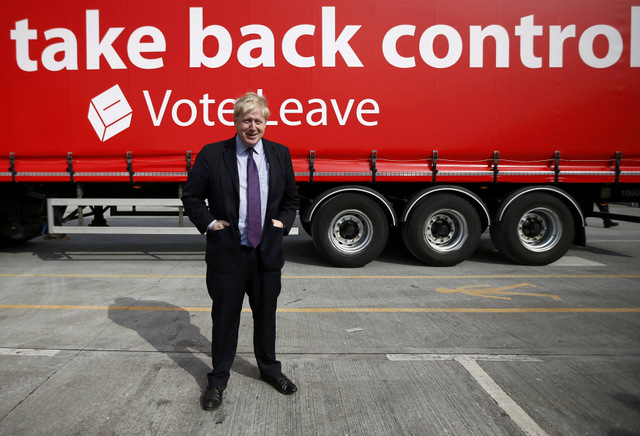The coming election will reflect a lot of the same frustrations that drove the Brexit vote.

Boris Johnson and the “Leave” campaign bus, when it all seemed so simple. PHOTO Reuters/Peter Nicholls
The Paris climate summit last year was a ray of sunshine for global climate policy, getting nations to commit to tightening targets and an aspirational 1.5C warming limit.
Credit for that success must go to the host nation, France, to the community of nations that supported it to the hilt, the European Union, and to the (once) United Kingdom.
Many Australian conservative politicians would have been perplexed at Britain’s leadership of Europe’s “Green Growth Group” of nations and its push – against strong objections from some EU members – for much stronger low-carbon policies in Europe.
On the basis of scientific advice that 2C of warming would bring yet more extreme, highly destructive weather, the UK under David Cameron led the argument for European policies to target the much safer limit of 1.5C of warming.
This was Britain at its best, working within a complex, unwieldy system to achieve advances weighty enough to shape world politics. Last week, less uplifting British qualities were on show.
Brexit was a victory for age over youth, which has most to lose from climate change. Where their elders saw danger in open borders and opted to put up the shutters, Britons aged from 18 to 24 saw opportunity in an open Europe and voted three to one against leaving.
The new Little Britain looks like it might have to do without its Scottish and Irish electorate, which voted overwhelmingly to stay in Europe. Disgruntled Scotland has now renewed its campaign to leave the UK, and a reunion of Ulster with republican Ireland is firmly on the table.
How Brexit will affect the global effort to mitigate climate change will take years to play out, but it’s a near-certainty that Europe will now stick with its 40 per cent 2030 target (against Australia’s 26 to 28 per cent) instead of the 50 per cent that the UK was pushing.
Any sustained economic slump arising from Brexit will help bring emissions down. But more significantly it will also diminish resources to develop clean energy, helped along by the fact that nationalist sentiment has more than a little in common with climate-change denial.
Britain’s new leader may be Cameron’s chief Brexit opponent, Boris Johnson, who once voiced scepticism about human-induced warming on the basis of a string of snowy British winters. That same shallow, ill-considered thinking surfaced repeatedly during the campaign.
I almost forgot – we have our own poll coming up. It too involves pent-up frustration with political and financial authority in an increasingly unequal Australia. Major parties are on the nose, as in Britain, and it’s likely that what divides us now will still divide us afterwards.
Climate policy is one of those divides, revealed in an admirably independent and thorough analysis of parties’ pre-election climate policies by Australia’s Climate Institute.
All were found wanting. The Greens and (surprisingly) the Glenn Lazarus Team came out best, but Green inflexibility and the GLT’s lack of detail were negatives. The Nick Xenophon Team scored well on ambition but also lacked detail.
The Climate Institute assessment didn’t include recent arrivals like the Renewable Energy Party or independents like Denison MP Andrew Wilkie. Both, I think, would have scored highly.
Applied globally, says the Climate Institute, Labor’s policies still wouldn’t keep warming below the dangerous 2C threshold, while the Coalition’s would leave us a disastrous 3C to 4C warmer.
Former Liberal leader John Hewson is having none of it. He absented himself from Malcolm Turnbull’s campaign launch on Sunday to tell a rally in Turnbull’s Sydney electorate that the need for bipartisan leadership on climate is “more than urgent”.
Many electors, seeing Australian emissions still rising while hearing false claims to the contrary, share Hewson’s concern. While time ticks away our political masters choose to talk of other things.
But however frustrated you are with the established order, don’t opt out. Our main game has to be a decarbonised economy. On Saturday vote for those who will work for it and avoid those who won’t.
“Lofty ambitions, great expectations and achieving carbon neutrality” is the title of the 24th Richard Jones Memorial Lecture in Hobart tonight (Stanley Burbury Theatre, 7pm), to be delivered by this year’s Tasmanian Australian of the Year, Jane Hutchinson.
